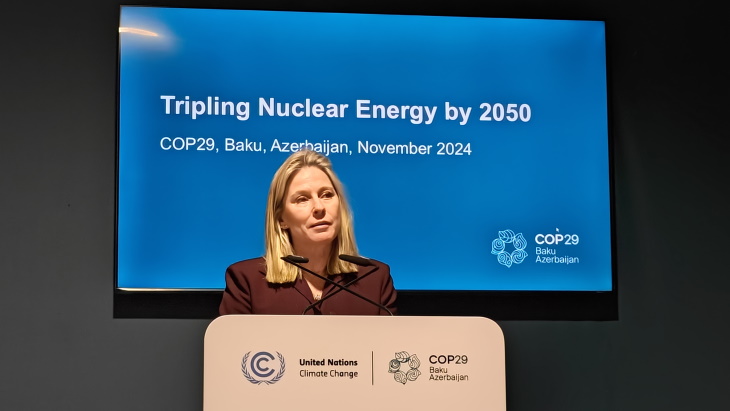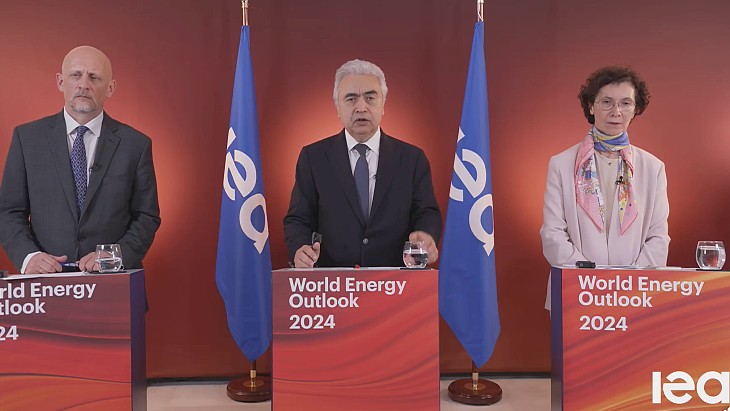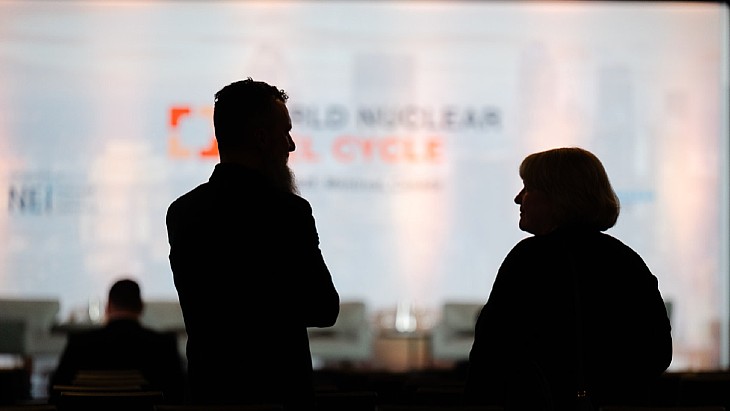UK should aim for net-zero GHGs by 2050, report says

In its report published today - Net Zero: The UK's contribution to stopping global warming - the Committee on Climate Change (CCC) states that the share of electricity generated by renewables and firm low-carbon power, such as nuclear, would need to rise from around 50% today to around 95% in 2050. Demand for electricity overall would increase due to additional demand from electric vehicles and heat pumps.
The report says that renewable generation could be four times today's levels, requiring a sustained and increased build out between now and 2050, complemented by firm low-carbon power options such as nuclear power and carbon capture and storage (CCS) (applied to biomass or gas-fired plants).
The CCC’s recommendation came shortly after France also proposed carbon-neutrality for 2050, which included operating nuclear plants for longer than currently planned.
Agneta Rising, director general of World Nuclear Association, said: "It's clear that we will need to make use of all options to tackle climate change effectively; without increased nuclear we will fail. The UK and France should take advantage of their nuclear experience. More and more countries looking at implementing long-term climate change goals are including nuclear energy. Experienced nuclear countries should build more and faster."
The CCC's base case foresees gas-fired generation with CCS generating more than 20% of electricity in 2050. However, electricity generation combined with CCS is a largely untested technology. The report notes that additional nuclear generation would be one option to replace some of the gas CCS, a further 15GW of nuclear capacity could be built at existing identified sites.
Rising said, "Nuclear generation is a proven solution for secure and reliable low-carbon generation that can be deployed at scale."
The report notes that there is potential for the costs of new nuclear generation could be significantly reduced with the right policies and measures. Nuclear generation costs in 2050 are projected to be potentially 28% lower than those for 2025, the largest reduction for any of the main low-carbon generation options.
Rising said, "The CCC is right to highlight that to deliver this there needs to be better financing arrangements and support for more nuclear deployment, which will increase scope for cost reductions through innovation and learning-by-doing."
Report
The CCC says the UK should "set and vigorously pursue" an ambitious target to reduce greenhouse gas emissions (GHGs) to 'net-zero' by 2050, ending the UK's contribution to global warming within 30 years, adding that this target will deliver on the commitment that the UK made by signing the Paris Agreement.
It is achievable with known technologies, it says, alongside improvements in people's lives, and within the expected economic cost that Parliament accepted when it legislated the existing 2050 target for an 80% reduction from 1990. However, this is only possible, it adds, if clear, stable and well-designed policies to reduce emissions further are introduced across the economy without delay. Current policy is insufficient for even the existing targets.
John Selwyn Gummer, the CCC's chairman, said the recommendation "emerges clearly from the extensive evidence presented here for the first time". He wrote in the report: "We have reviewed the latest scientific evidence on climate change, including last year’s IPCC [International Panel on Climate Change] Special Report on Global Warming of 1.5°C, and considered the appropriate role of the UK in the global challenge to limit future temperature increases. We have built a new understanding of the potential to achieve deep emissions reduction in the UK and made a fresh appraisal of the costs and benefits to the UK economy of doing so. We conclude that net-zero is necessary, feasible and cost-effective."
Industry response
Tom Greatrex, chief executive of the Nuclear Industry Association (NIA), said the report "rightly highlights just how far we still need to go" for the UK to achieve net-zero greenhouse gas emissions by 2050. He said: "In decarbonising power, it highlights that we will need more low-carbon sources of electricity - confirming other academic and expert reports - with nuclear continuing to play an integral part alongside renewables."
He added: "Nuclear has long provided the UK with clean, reliable, secure electricity, and it will be needed to help meet the increased demand from the electrification of heat and transport. Just as this report is a timely wake up call to government and society, it is also an important reminder that reducing our reliance on high emission fuels to generate power is the priority. Clean electricity sources need to work together, not pit themselves against each other, if we are to meet 2050 ambitions."
The NIA noted that a report published last September by the MIT Energy Initiative (MITEI) - The Future of Nuclear Energy in a Carbon-Constrained World - shows that as you head towards zero carbon emissions, it gets significantly more expensive if you exclude nuclear power.
The OECD Nuclear Energy Agency (NEA) published a report in January - The Costs of Decarbonisation: System Costs with High Shares of Nuclear and Renewables - which shows that a mix relying primarily on nuclear energy is the most cost-effective option to achieve a decarbonisation target of 50g CO2 per kWh.
The GMB trade union noted that the UK accounts for 1%-2% of global emissions and its track record of reducing them is "one of the best in the world".
"GMB is advocating an energy mix that is reliable, affordable, low/zero carbon and with subsidies paid from general taxation," it said. "This means renewable energy sources and new nuclear power stations with gas used for home heating to lower emissions for the foreseeable future. Hydrogen should be added to the gas grid. There are on average one day in six over any year when there is little or no wind."
Landmark report
The latest Digest of UK Energy Statistics from the Department for Business, Energy and Industrial Strategy (BEIS) shows nuclear is the largest source of low-carbon power in the UK, providing 41% of low-carbon power generated in the UK in 2017. In 2018, nuclear avoided the emission of 20.63 million metric tons of carbon dioxide.
BEIS Secretary of State Greg Clark said today that it is evident the CCC report is going to be "one of the most important publications not just that we've had on climate in this country but around the world". He said: "One of our proudest achievements as a country is that - with all political parties uniting, and civil society coming together - we have led the world in tackling climate change."
Since 2000, "no country in the G20 has gone further than Britain in decarbonising their economy", he said. "Six years ago, 40% of our electricity generated came from coal. When I checked my Gridwatch app this morning there wasn’t a single contribution from coal being generated."
Clark was the Opposition spokesman during the passage of the Climate Change Act in 2008. "Through the passage of the bill the 60% reduction target to 80%. And that was the first law in the world to set a legally binding carbon reduction targets. More than a decade later our ambition - far from having diminished - is strengthened," he said.
BEIS commissioned the CCC report in October last year.

_99697.jpg)







_79311.jpg)


